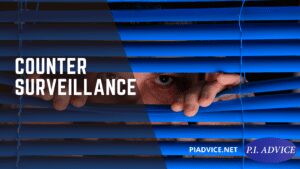A large disadvantage for individuals looking to become a private investigator is the lack the understanding of private investigator terminology and words that are commonly used.
Years ago one of my initial interviews with a private investigation agency I was able to score some valuable points with the hiring investigator by having some understanding of the words commonly used in the industry.
Candidates interviewing for a position will find many of the following words useful during the interview process and for their general knowledge. Below is my interpretation of words I feel you should know, along with any formal definition and reference.
Contents
- 1 SURVEILLANCE
- 2 COUNTER SURVEILLANCE
- 3 DRIVE-BY SPOT CHECK
- 4 OPEN-SOURCE INTELLIGENCE
- 5 DEPOSITION
- 6 CASE
- 7 PRETEXT
- 8 BURNED
- 9 HEATED
- 10 SPY CAMERA/COVERT CAMERA
- 11 OUT-OF-POCKET/IN POCKET
- 12 FISHING
- 13 CLAIMANT
- 14 MOBILE SURVEILLANCE/MOVING AUTOMOBILE SURVEILLANCE
- 15 SUBJECT
- 16 Example of using subject in a report section
- 17 STATIONARY SURVEILLANCE
- 18 ROUGH SHADOWING
- 19 SPECIAL INVESTIGATION UNIT
- 20 CANVASSING
- 21 RECORDED STATEMENTS
- 22 CONCLUSION
SURVEILLANCE
Observing someone or something covertly. Surveillance can be documented or undocumented.
Dictionary definition for Surveillance – Close watch kept over someone or something (as by a detective)
There are many different types of surveillance that you can read about here.

COUNTER SURVEILLANCE
This can happen in various forms but most commonly, counter-surveillance is conducted to determine if surveillance efforts are being conducted on the individual.
Extra attention may be spent paying attention to surroundings or additional video cameras may be set up at a person’s residence to determine if surveillance efforts are being conducted against them.
If you would like to learn more about counter surveillance and ways to even ditch someone conducting surveillance on you, you can read more about that here.
DRIVE-BY SPOT CHECK
A drive-by spot check can happen for various reasons by a private investigator but most commonly it takes place by surveillance investigators who don’t have a view of a location where surveillance is being conducted. So a drive-by of the location is conducted to see if there has been any change in activity at the location. This type of private investigator terminology will be spoken about in reference to surveillance cases and will be referenced in surveillance reports.
OPEN-SOURCE INTELLIGENCE
Open-source intelligence is the collection of publicly available data and information that is analyzed to help, well the investigator, in this case, to help with an investigation.
For example, a private investigator will conduct a preliminary investigation before surveillance is conducted using sources like:
- Internet Resources like Google, Youtube, Twitter, Facebook, Instagram, etc., to locate information about the subject of an investigation.
- Government available public data (property records)
- Commercial public data
- Print media, magazines, television, etc.
Investigators use some data that is only for licensed investigators (because it is sensitive information) but the other data that investigators use, everyone can use. Investigators are just very good at digging and researching this information.
If you would like to learn more about using different resources to locate individuals you can read more about skip tracing here.
DEPOSITION
A deposition is a statement under oath and is recorded or written and may be used in court. It is also possible for a deposition to be videotaped as well.
CASE
An assignment that an investigator is conducting an investigation on. When I refer to an assignment I typically refer to it as a case.
Dictionary definition for Case (the closest I could find that relates) – A set of circumstances or a state of affairs; a situation. A situation that requires investigation, especially by a formal or official body.
PRETEXT
A ruse or story is given to an individual to disguise the reason for one’s true intentions.
Example- I will knock on the door of my subject’s residence inquiring about a home for sale in the area. My true intention of the door knock is to determine who is within the residence.
Dictionary definition of a Pretext – A purpose or motive alleged or an appearance assumed in order to cloak the real intention of state of affairs.
I have written about pretext laws in detail here if you are interested in learning more about pretexting.
BURNED
An investigator that has been compromised by the subject he/she has been conducting surveillance on. In other words, the subject is aware of the surveillance investigator’s presence.
HEATED
The word heated can come in many forms. In regards to a neighborhood where surveillance is being conducted, neighbors can become suspicious of an investigator’s presence in the area which can directly affect the surveillance investigation.
The word can also be referred to as a subject being suspicious about your presence during surveillance but not knowing your true intentions.
SPY CAMERA/COVERT CAMERA
In most cases, private investigators are equipped with a covert camera. They can be disguised as a pen, key fob, glasses, pager, or anything else that the imagination can come up with.
Covert cameras have been known to be placed in everyday devices like wall chargers, fire alarms, alarm clocks, decorations, etc.
Spy camera’s only limitations are the memory it can store and how long the battery will last.
For more information about private investigator equipment, read it here.
OUT-OF-POCKET/IN POCKET
Having lost sight of your subject during surveillance and you do not know their whereabouts. You may have lost sight of your subject while following your subject on foot or in a vehicle.
In pocket means you know the whereabouts of your subject.
FISHING
A term I used very early in my surveillance career to describe the actions of a suspicious claimant or subject. I haven’t heard it used very often by other investigators. Fishing refers to when your subject drives or does something specifically to confirm their suspicions. They may drive down a dead-end road to see if you will follow them or something similar. They are trying to see if you will take the bait, hence the word fishing.
CLAIMANT
An individual that has a claim with an insurance company or self-insured company. You will often refer to the individuals you conduct an investigation on as claimants if the client is insurance-related. Typically this refers to a worker’s compensation or disability investigation.
Dictionary definition of Claimant-One that asserts a right or title (a claimant to an estate).
To read more about the difference between a claimant and an insured you can read more about that here.
MOBILE SURVEILLANCE/MOVING AUTOMOBILE SURVEILLANCE
Is when you are in the process of following a subject/individual during surveillance in a vehicle. I write this term quite frequently in my investigative reports.
SUBJECT
Used in a variety of manners but can be used to identify the individual that surveillance is being conducted on. It can also be used to quickly identify individuals in a report.
Example of using subject in a report section
A caucasian male, stating approximately 6′ tall and weighing approximately 200 pounds with a white short sleeve shirt and brown pants exited the residence and departed on foot and will hereafter be referred to as subject #1.
Subject #1 returned to the residence on foot and entered the residence out of view.
If you would like to read more about surveillance reporting writing you can read about that here.
STATIONARY SURVEILLANCE
The times when you are in a stationary position when conducting surveillance. In investigative reports, this word is referred to when a point of observation or stationary surveillance position is established.
Located definition for Stationary Surveillance – Observation of activities of a subject from one vantage point. Also known as a stakeout.
ROUGH SHADOWING
Continuing to follow or conduct surveillance on a subject despite the subject being aware of the investigator’s presence. This type of surveillance causes to subject to be uncomfortable and can possibly be considered a form of harassment. This is true especially when others outside of the investigation become aware of surveillance efforts causing embarrassment or ridicule. Many investigators go out of their way to avoid any accusation of rough shadowing.
SPECIAL INVESTIGATION UNIT
In my experience, the Special Investigation Unit or SIU has carried out a variety of investigative duties. Individuals in SIU can be responsible for identifying potential or existing fraud, conducting interviews, photographing for scene investigations, obtaining evidence, retrieving documents, etc…
CANVASSING
Searching for your subject after you lose them during mobile surveillance. Another example of canvassing would be searching a neighborhood for witnesses.
Dictionary definition of canvassing– To examine carefully or discuss thoroughly; scrutinize. “The evidence has been repeatedly canvassed in American courts” (Anthony Lewis)
RECORDED STATEMENTS
Statements or interviews that are recorded. In the insurance investigation industry recorded statements are requested from the insurance companies. An investigator will meet with a claimant and conduct an extensive interview which will cover basic information, previous medical history, daily activities, current medications, and the details of a workplace accident if applicable. It should be noted that the claimant or subject is not under oath when answering the investigator’s questions.
Once the recorded statement is completed a formal report is created and sent to the client with the recorded audio. The insurance company will use the statement to have a more detailed look at the accident or incident. This will help the insurance company move forward with the insurance claim.

CONCLUSION
There are many more words used in the private investigation field. The ones provided in this article are commonly used in the insurance investigation industry. It will be helpful to future investigators to know these terms prior to interviewing for an investigator position. I hope this helps you in your journey.
Andrew
Recent Posts
Hawaii is probably one of the most interesting states to work as a private investigator if you are not used to the culture or a native of the state. And if you are not a local, that is something...
How to become a private investigator in Georgia

